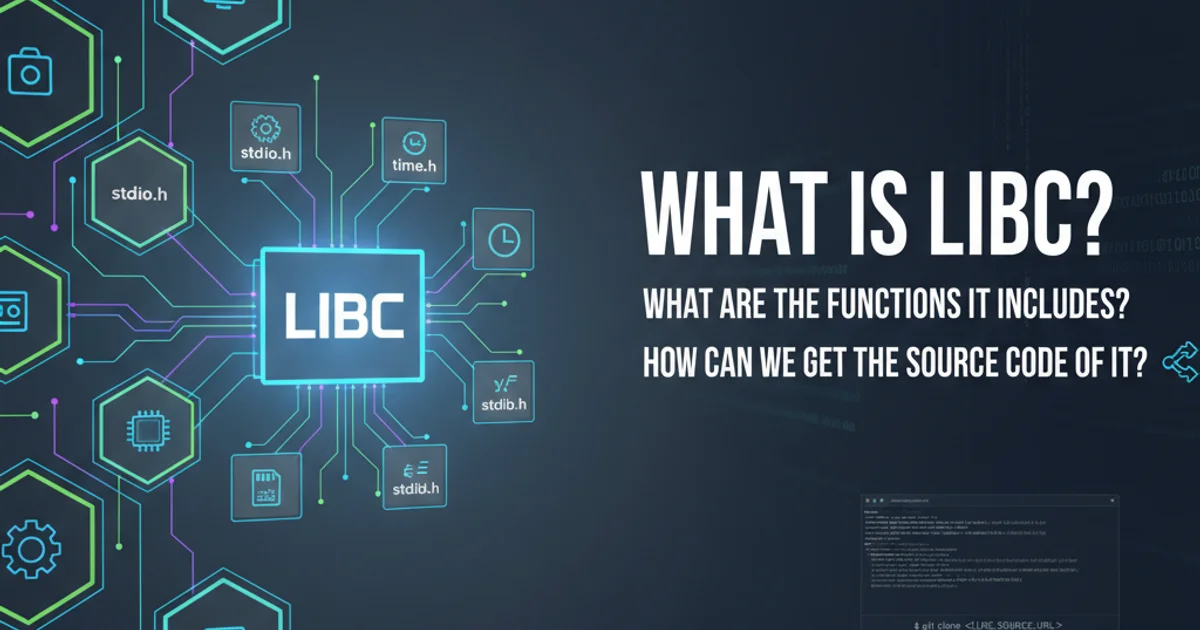what is libc? what are the functions it includes? how can we get the source code of it?
Categories:
Understanding libc: The Foundation of C Programming

Explore the C standard library (libc), its essential functions, and how to access its source code for deeper understanding and development.
The C programming language, while powerful, is intentionally minimalist. It provides core language constructs but delegates many common tasks, such as input/output, string manipulation, and memory management, to a standard library. This library is universally known as libc (C standard library) or sometimes glibc (GNU C Library) on Linux systems. Understanding libc is crucial for any C programmer, as it forms the bedrock upon which most C applications are built.
What is libc?
libc is a collection of header files and pre-compiled routines (functions) that provide standard functionalities required by C programs. It's an implementation of the C Standard Library as defined by ISO C standards (e.g., C99, C11, C17). When you compile a C program, the linker typically links it against libc by default, making all its functions available to your code. Without libc, writing even a simple "Hello, World!" program would be significantly more complex, as you'd have to implement basic I/O operations yourself.
flowchart TD
A[C Source Code] --> B[Compiler]
B --> C[Object File (.o)]
C --> D[Linker]
D --> E["libc (Static/Dynamic)"]
E --> F[Executable Program]Simplified C Compilation and Linking Process with libc
Key Functions and Categories within libc
libc is vast, encompassing hundreds of functions categorized by their purpose. Here are some of the most commonly used categories and examples of functions within them:
1. Input/Output Functions (stdio.h)
These functions handle reading from and writing to files and the console.
#include <stdio.h>
int main() {
printf("Hello, World!\n"); // Prints to standard output
char buffer[256];
scanf("%s", buffer); // Reads from standard input
fprintf(stderr, "You entered: %s\n", buffer); // Prints to standard error
return 0;
}
Example of basic I/O functions from stdio.h
2. String Manipulation Functions (string.h)
Functions for copying, concatenating, comparing, and searching strings.
#include <string.h>
#include <stdio.h>
int main() {
char str1[20] = "Hello";
char str2[20] = "World";
strcat(str1, str2); // Concatenates str2 to str1
printf("Concatenated: %s\n", str1); // Output: HelloWorld
printf("Length: %zu\n", strlen(str1)); // Output: 10
return 0;
}
Example of string manipulation functions from string.h
3. Memory Management Functions (stdlib.h)
Essential for dynamic memory allocation and deallocation.
#include <stdlib.h>
#include <stdio.h>
int main() {
int *arr;
arr = (int *) malloc(5 * sizeof(int)); // Allocate memory for 5 integers
if (arr == NULL) {
perror("malloc failed");
return 1;
}
for (int i = 0; i < 5; i++) {
arr[i] = i * 10;
}
printf("First element: %d\n", arr[0]);
free(arr); // Free the allocated memory
return 0;
}
Example of dynamic memory allocation using malloc and free
4. Mathematical Functions (math.h)
Provides common mathematical operations, often requiring linking with -lm.
#include <math.h>
#include <stdio.h>
int main() {
double x = 4.0;
printf("Square root of %.2f is %.2f\n", x, sqrt(x));
printf("Power of %.2f to 2 is %.2f\n", x, pow(x, 2.0));
return 0;
}
Example of mathematical functions from math.h
5. Utility Functions (stdlib.h)
Includes general utilities like type conversions, random number generation, and program control.
#include <stdlib.h>
#include <stdio.h>
int main() {
char *str = "12345";
int num = atoi(str); // Convert string to integer
printf("Converted number: %d\n", num);
printf("Random number: %d\n", rand()); // Generate a random number
return 0;
}
Example of utility functions from stdlib.h
libc provides many functions, always consult the official C standard documentation or your system's man pages for precise function signatures, behavior, and potential error conditions.How to Get the Source Code of libc
Accessing the source code of libc can be incredibly insightful for understanding its implementation details, debugging, or even contributing to its development. The most widely used libc implementation on Linux systems is glibc (GNU C Library).
1. Downloading glibc Source Code
You can download the official glibc source code from the GNU project's website. It's usually available as a compressed tarball.
1. Visit the GNU glibc website
Navigate to the official GNU glibc releases page, typically found at https://www.gnu.org/software/libc/.
2. Download the latest stable release
Look for the 'Download' section and choose the latest stable version (e.g., glibc-X.Y.tar.gz).
3. Extract the archive
Once downloaded, use a command like tar -xzf glibc-X.Y.tar.gz in your terminal to extract the contents. This will create a directory containing all the source files.
2. Browsing Online Repositories
Many libc implementations, including glibc, have their source code hosted in public version control systems, often mirrored on platforms like GitHub.
1. Access the glibc Git repository
You can browse the glibc source code directly via its official Git repository or a mirror. For example, a common mirror is https://sourceware.org/git/?p=glibc.git.
2. Clone the repository (optional)
If you want a local copy for deeper exploration or development, you can clone it using git clone git://sourceware.org/git/glibc.git.
glibc from source can be a complex process, often requiring specific build environments and configurations. It's generally not recommended for casual users but is essential for system developers or those contributing to glibc itself.